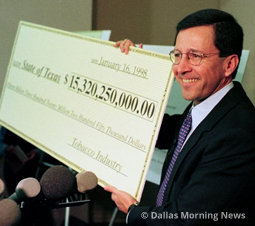© 2015 The Texas Lawbook.
By Mark Curriden
TEXARKANA (April 14) – Twenty years ago, then-Texas Attorney General Dan Morales filed an historic federal lawsuit accusing the tobacco industry of racketeering and fraud.
Morales said the case would make Big Tobacco change how it did business, force the cigarette companies to make less dangerous products and stop the industry from marketing to teenagers.
The lawsuit, he contended, would require the tobacco companies to fork over billions and billions of dollars, which would be used to reimburse the state of Texas for smoking-related Medicaid costs and fund anti-smoking programs.
“This was the most important health-related litigation in history,” says former Mississippi Attorney General Mike Moore. “Cigarette smoking was the number one cause of death in the entire world.

Two decades later, legal experts remain divided over whether to label the litigation a success.
The Texas state treasury pocketed billions of dollars from the litigation, though only pennies on the dollars won in the case went to smoking cessation efforts. Teen smoking plummeted, but cigarettes are just as addictive and dangerous.
The tobacco companies are more profitable than ever. The trial lawyers representing Morales got filthy rich. Republican political leaders opposed the litigation from the state, then flushed the cash proceeds into the toilet of the general budget and finally passed state laws banning individual Texans sick or dying from smoking from suing cigarette makers.
What about Democrat Dan Morales? He married a former exotic dancer, lost his bid for governor and eventually went to federal prison.

“The litigation exposed the tobacco industry’s lies, dramatically reduced teen smoking and resulted in limits in cigarette advertising,” Myers says. “But it is far short of meeting the objectives. We didn’t change the industry’s conduct at all. The product is no safer.”
Tobacco Sued First
In the Texas legal battle, the tobacco companies actually struck first by preemptively filing a lawsuit to prevent Attorney General Morales from suing cigarette makers. The courts quickly rejected the lawsuit as having no merit.
The tobacco companies had already teamed with tort reform advocates to successfully lobby the Texas Legislature to pass a law prohibiting Texans from being able to sue the “makers of natural products” that have potential health risks. The law identifies those natural products as milk, eggs, sugar, bread, butter and… cigarettes, which actually have hundreds of chemical additives.
 On March 29, 1996, Texas was the sixth state to sue Big Tobacco seeking reimbursement for healthcare costs related to smoking. Mississippi filed first in 1994, followed by Minnesota, Florida, West Virginia and Louisiana.
On March 29, 1996, Texas was the sixth state to sue Big Tobacco seeking reimbursement for healthcare costs related to smoking. Mississippi filed first in 1994, followed by Minnesota, Florida, West Virginia and Louisiana.
The lawsuits were considered extreme long shots for success. The tobacco companies had been sued more than 400 times and had never lost nor settled a single case. In addition, the legal theories at the heart of the state cases were novel and untested.
Scorched Earth Tactics
Plaintiffs’ lawyers, however, unearthed thousands of incriminating internal industry documents that showed the tobacco companies added hundreds of ingredients to cigarettes, targeted teenagers through cartoon marketing efforts and took significant steps to cover up the dangers of smoking.
“We discovered a confidential tobacco industry internal legal memo that stated, ‘The goal in litigation is not to spend all of our money, but to force the plaintiffs to spend all of their money,’” says Houston trial lawyer Harry Potter, who was a Texas special assistant attorney general who supervised the Texas tobacco case.
Potter, who refused to publicly discuss the tobacco litigation for nearly 18 years, says the tobacco companies demanded that the state turn over tens-of-millions of documents that spanned several decades.
“We hired dozens of people to photocopy state records and we had to get several 18-wheeler trucks to transport all the documents to the tobacco industry’s lawyers,” Potter says.
Potter remembers the day Liggett Tobacco Co. turned over millions of pages of internal industry documents to a state court in Mississippi.
“While the tobacco company lawyers raced to get a stay and have the documents sealed, our outside lawyers put the documents on a private jet to Texarkana, where we gave them to [U.S. District] Judge David Folsom for his inspection and review,” Potter says. “We knew the state court ruling sealing the documents didn’t apply to federal judges.”
By 1998, more than 40 states had filed suit. Stocks of the major tobacco companies plunged, which caused Wall Street analysts to publicly pressure cigarette makers to seek a global settlement agreement.
Pressure to Settle
Each lawsuit sought hundreds of millions or even billions of dollars in damages. No case was bigger than Texas’, which legal analysts predicted would bankrupt the tobacco companies if the state were to prevail.
The litigation took a dramatic turn in April 1997, when lawyers for the tobacco companies asked to meet with Mississippi Attorney General Moore and Myers from Tobacco-Free Kids to discuss the possibility of a global settlement that would cover all the states, including Texas, that sued Big Tobacco.
The meeting took place in a conference room at the Marriott Hotel in Crystal City, just outside of Washington D.C. Those who attended the meeting included the CEOs of the five cigarette makers and elite Wall Street lawyers Herb Wachtell and Meyer Koplow of Wachtell, Lipton, Rosen & Katz and Arthur Golden of Davis Polk & Wardwell.
“The CEOs of Phillip Morris and RJR told us that to show they were serious, they agreed right then to give up the Marlboro Man and Joe Camel, their two most successful marketing efforts,” Moore says. “We were stunned. That’s when settlement talks really heated up.”
Mississippi, which was set to go to trial in July 1997, settled for $3.4 billion. Florida settled during jury selection two months later for $11.3 billion.
Texas takes Center Stage
The Texas lawsuit was the next tobacco case set for trial.
“Texas suddenly became so very important because it had an actual trial date and that scared the tobacco companies silly,” says Joe Rice, a partner at South Carolina-based Motley Rice, a law firm that represented 31 states, including Texas, involved in the tobacco litigation.
Rice said the Texas lawyers brilliantly sued the cigarette makers in the federal courts of the Eastern District of Texas, which employed a “rocket docket” that streamlined pretrial litigation proceedings so that the parties could have a trial date set within 16 or 18 months.
“The Texas lawsuit wasn’t first but it was so important because it is such a large state with potentially huge damages,” says Richard Daynard, a professor at Northeastern University School of Law and president of the Public Health Advocacy Institute in Boston.

“The Texas case had the potential to bring the tobacco companies to their knees,” Daynard says. “No doubt, the case had a major impact, but it clearly fell far short of Morales’ goals. Cigarettes are definitely no safer today.”
The legal strategy of challenging Big Tobacco on so many fronts in courts throughout the U.S. forced the major tobacco companies – Phillip Morris, RJ Reynolds and Brown & Williamson – to the negotiation table.
$17.6 Billion Settlement
If money is the primary grading point – in most litigation, it is the only grade – the Texas case was an extraordinary success.
In January 1998, the Texas lawsuit settled on the eve of trial for a record $15.3 billion, which is the largest settlement of a single case in U.S. history.
“Just about every lawyer who knew anything about the case thought it was a long shot for the state and that the state’s case faced significant hurdles,” says Houston trial lawyer Richard Mithoff. “But even more importantly, the tobacco companies were looking for peace and it was absolutely the right time for the state to push for a settlement.”

Mithoff’s efforts, combined with a clever “most favored nation’s” clause that Potter and the state’s outside lawyers included in the Texas settlement agreement, led Big Tobacco to fork over an additional $2.3 billion in July 1998, which increased the overall Texas settlement to $17.6 billion.
The cigarette makers have paid Texas $10.2 billion so far and make annual payments of about $490 million to the state, according to court records. Under the settlement agreement, the payments will continue in perpetuity, surpassing $15 billion in 2023.
To pay for the settlement and lawyers’ fees, tobacco companies increased the price of cigarettes by $1.40 per pack, which impacted cash-strapped teenagers the most. As a result, teen smoking plummeted. Surveys showed that nearly 36 percent of teens smoked in 1996, but only 12 percent of them do today.
Texans for Lawsuit Reform, an organization of corporate executives that supports laws that limit people’s ability to sue when they’ve been injured or wronged, blasted the tobacco settlement for “one of the lowest smell test scores in the history of plaintiff litigation in Texas.”
TLR, in a white paper authored by its general counsel, criticized the deal because it allowed the cigarette makers to “shift the entire cost of the settlement – trillions of dollars over the life of the settlement – not onto the tobacco companies, but onto smokers compelled to pay a de facto tax.”
Twenty-one paragraphs later, in the same white paper, TLR asked why Texas officials sued “when the state could have just as easily – and far more cheaply – have raised the same revenue simply by raising cigarette taxes?”
Even lawyers for the tobacco companies say TLR’s criticism of the settlement as a tax increase – only to later apparently advocate a cigarette tax as preferable to the settlement – shows that the group was biased against any deal that allowed the winning trial lawyers to make money.
Public health officials also slam TLR’s failure to recognize that the $1.40 price hike was the primary reason why teen smoking declined so dramatically.
Only 2 Percent for Smoking Cessation Efforts
Even so, Myers and others point out that Texas budgeted only $10.2 million of the $490 million – or two percent – to be used for anti-smoking efforts in 2016. At the same time, the Campaign for Tobacco Free Kids say that the tobacco companies will spend an estimated $630 million on marketing their products in Texas.
The public health group says that the annual healthcare costs for treating sick smokers in Texas will be $8.8 billion in 2016.
State records show that $110 million of the settlement funds goes annually into a special endowment to fund healthcare for children and cancer research. The endowment currently has a balance of more than $2 billion.
Lawyers for the tobacco industry say that the annual payments are court ordered as part of the settlement and that the Texas Attorney General’s office ultimately has the knowledge of how the settlement money is used.
Potter, who was one of the lead settlement negotiators, says the deal nearly imploded at the end over the issue of fees to be paid to the private lawyers representing the state.
“We were meeting almost around the clock at the DFW Hyatt for the first few days,” he says.
Potter and Rice, who led negotiations for the state, said deciding on the dollar figure was easy.
“Hammering out the details became like the movie ‘Groundhog Day’ over and over and over,” Potter says.
Finally, the tobacco companies agreed to set up a special fund to pay the outside lawyers separate from monies going to the states. An arbitration panel selected by lawyers on both sides of the case determined the amount of the legal fees to be paid to the attorneys representing the state.
Texas Trial Lawyers Get $3.3 Billion
The private lawyers representing Texas – John Eddie Williams, Walter Umphrey, Harold Nix, Wayne Reaud and John O’Quinn – had a contract with Morales that required that they pay all the state’s costs in the litigation and they would be paid 15 percent of any money they won for the state in the litigation. If the state lost, the lawyers would receive nothing.
Initially, the Big Five, as they were known in legal circles, asked the arbitration panel for $25 billion – an amount even the arbitrator they appointed said was outrageous. Instead, the panel awarded $3.3 billion to be paid by the cigarette makers over 25 years.
So far, Big Tobacco has paid the Texas lawyers nearly $2 billion. The cigarette companies continue to send Umphrey and the group about $120 million annually, which will end when the $3.3 billion award is met.
Tort reform groups blasted the lawyers’ fees as excessive and claimed the plaintiff’s lawyers did almost no work to deserve such large sums of money – a claim that even the lawyers for the tobacco companies and leaders in the public health community say is factually untrue.
“Did the lawyers deserve that much – does anyone deserve that much?” asks Moore. “It’s a lot of money, but it is also a free market system and the tobacco companies agreed to pay it, which meant cigarette prices went up a little more and that means fewer teenagers can afford to smoke.”
Indeed, the Big Five from Texas bought new yachts and private jets, but they also donated tens-of-millions to their colleges, law schools and to fund healthcare programs.
Mithoff, who was paid separately by Harris County, used his fees to create an endowment to help low-income people in Houston receive healthcare.
“The bottom line is that the tobacco litigation achieved some tremendous successes and the lawyers should be pleased with that,” says Myers of the Campaign for Tobacco Free Kids. “But measured against the potential successes and the potential good that could have been achieved, Texas and many other states fell far short of their objectives.”
Part Two Tomorrow: “Your Boss is a Crook!” – The Phone Call to Harry Potter that Sent Texas AG Dan Morales to Federal Prison
© 2016 The Texas Lawbook. Content of The Texas Lawbook is controlled and protected by specific licensing agreements with our subscribers and under federal copyright laws. Any distribution of this content without the consent of The Texas Lawbook is prohibited.
If you see any inaccuracy in any article in The Texas Lawbook, please contact us. Our goal is content that is 100% true and accurate. Thank you.